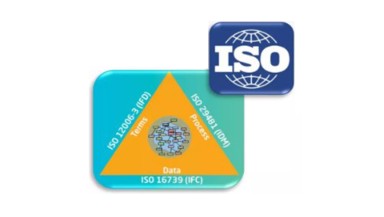Zigurat Global Institute of Technology
Blog / BIM & Construction Management
BIM Software Tools for all Occasions
Categories

When speaking about BIM software, it is important to keep in mind that we are not discussing any particular computer program. BIM - Building Information Modelling - is a process that provides the AEC sector professionals with a digital representation of physical and functional characteristics of a facility. BIM is a working methodology that builds upon collaborative work, interoperability, circular workflows, and coordination. However, to achieve all that, we have to choose a software program suited to our needs and make good use of it. There are many BIM software solutions available today. We might even say that narrowing down the products to choose from is the real challenge. Different software solutions are recommended for carrying out different tasks. In what follows, we are going to present some of the tools available in today’s market. 
BIM Architecture Software
The function of BIM systems goes beyond just a computer-aided design (CAD). When utilized properly, it can help to reduce costs, spot and fix errors before they happen in the actual construction, and accelerate construction schedules. BIM architecture software gives engineers and architects the right tools and insights in planning, designing, constructing, and managing the construction of buildings and infrastructures more efficiently. Some of the packages available to the AEC sector professionals for BIM modeling to work collaboratively and simultaneously on their projects are:
- Revit (Autodesk) is a building information modeling tool for structural and MEP engineering, construction, and architectural design. This one of the most popular software packages in the market is used by MEP engineers, architects, designers, contractors, and landscape architects among others.
Notable Features: Multi-Disciplinary Tools, Immersive Models, Detailed Visualizations, Documented Images, Interoperable Platform To take into account: Compatible with Microsoft Windows only. 
- ArchiCAD (Graphisoft) is a 3D architectural BIM tool for design and modeling. Compatible with Mac and Windows desktops, it is used by urban planners, architects, and designers to enhance their design workflow processes. Regarded as one of the first BIM implementations, ARCHICAD is a pioneer of CAD tools that have the capability of creating both 2D and 3D geometry.
Notable features: its algorithmic design that helps to avoid gaps between early stage design and BIM, its open workflow that enables participation of project members regardless of the tool they use 
- Allplan Architecture (Nemetschek Company) is a universal and precise building information modeling software solution that gives its users full control over their projects and the ability to produce building designs and construction drawings with creativity, freedom, and flexibility.
Notable features: BIM-aided design, design freedom for 3D objects, visualization at the highest level, smooth data exchange and information management, easy access to tools based on roles and tasks. Allplan Youtube
- AECOsim Building Designer (Bentley) is a building design software system built to design, analyze, construct and manage infrastructures of any scale and type. It can be used by architects to electrical, mechanical and structural engineers.
Notable features: effective collaboration across multi-discipline teams in a common design environment and streamlined workflow, production of building documentation and reports directly from a user’s intelligent building model. 
- Digital Project (Gehry Technologies) is a software to build BIM & CAD models regardless of their geometric complexity.
Notable features: powerful geometry, knowledge-driven modeling, unlimited scalability, interoperability  However, for specific tasks, there is a variety of other software solutions available. We’ve grouped the rest of BIM software into one of 10 categories: planning and construction management; measurements and cost control; calculations, representation and visualization of structures, calculation and/or representation of mechanical, engineering and plumbing (MEP) systems; energy efficiency studies; facility management; visualization and revisions; conflict detection; modeling and rendering; Collaborative BIM Solutions/SaaS (Software as a Service) for BIM.
However, for specific tasks, there is a variety of other software solutions available. We’ve grouped the rest of BIM software into one of 10 categories: planning and construction management; measurements and cost control; calculations, representation and visualization of structures, calculation and/or representation of mechanical, engineering and plumbing (MEP) systems; energy efficiency studies; facility management; visualization and revisions; conflict detection; modeling and rendering; Collaborative BIM Solutions/SaaS (Software as a Service) for BIM.
BIM Software for Planning & Construction Management
This type of software allows to explore and evaluate a project’s constructability before it is built while improving its cost reliability and increasing coordination between stakeholders.
- Vico 4D BIM Scheduling (Trimble)
- Solibri (Nemetschek)
- Synchro Pro
- Navisworks (Autodesk)
- Navigator (Bentley)
- BIM 360 Glue (Autodesk)
- Think Project
- Zutec
BIM Software for Measurements and Cost Control
Here you find software that can be used for construction estimating, scheduling and design management. These are integrated platforms where users can choose from focused workflows for design, cost and time.
- Arquimedes (CYPE)
- Vico 5D BIM Estimating (Trimble)
- Presto (Soft)
- Mideplan (Arktec)
- iTwo (RIB)
- COSTX (Exactal)
BIM Software for Calculations, Representation and Visualization of Structures
Here you find software to calculate and visualize different materials and structures.
- CYPECAD (CYPE)
- CYPE 3D
- Tekla Structures (Trimble)
- Robot (Autodesk)
- Graitec Advanced Steel-Concrete (Autodesk)
- Revit Structure (Autodesk)
- SAP2000 (CSI)
- Tricalc (Arktec)
- Dlubal
- Diamonds (BuildSoft)
- Cubus
- Fine
- Risa
BIM Software for Calculation and/or Representation of Mechanical, Engineering and Plumbing (MEP) systems
BIM software for MEP (mechanical, electrical, and plumbing) building systems will help us to design, detail, estimate, fabricate and install the systems more quickly and accurately. Through the use of those tools, the teams will improve collaboration, streamline projects, and reduce risk and waste across the entire project team.
BIM Software for Energy Efficiency Studies
Conducting analyses on the design model is critical, as this leads to considerable energy saving. As part of the BIM process, we can calculate the reductions using whole building energy analysis. Some studies, for example, show that when a design team uses whole building energy analysis, they can save an average of 20 percent on energy use.
- Green Building Studio (Autodesk)
- EcoDesigner (Graphisoft)
- EnergyPlus (CYPE)
- AecoSIM Energy Simulator (Bentley)
BIM Software for Facility Management
For facility managers, BIM software can be a powerful new tool to enhance a building’s performance and manage operations more efficiently throughout a building’s life.
- CenterStone CAFM (Trimble)
- FM: Systems
- Onuma
- ArchiFM (Graphisoft)
- ARCHIBUS
- Aconex
Visualization and Revisions
Here we list tools that can be used to view, analyze, merge and discuss BIM models. Their use allows the planner to plan, review and implement their schedule within a seamless workflow.
- BIMx (Graphisoft)
- VICO (Trimble)
- Solibri Model Viewer
- DDS-CAD Viewer (Nemetschek)
- Tekla BIMSight (Trimble)
- Revizto
Conflict Detection
BIM software for conflict detection provides a fully automated routine to identify, visualize and resolve conflicts between the architectural design and the engineering design of the MEP networks.
- Solibri Model Checker
- Tekla BIMSight (Trimble)
- MEP (Trimble)
- MEP Modeller (Graphisoft)
Modeling and Rendering Software
Here we offer you a list of 3D modeling and rendering software for design visualization.
- Cinema-4D (Maxon)
- Lumion
- 3ds Max (Autodesk)
- SketchUp (Trimble)
- ArtLantis (Abvent)
- Maxwell Render (Maxwell)
- Rhinoceros
- MAYA
Collaborative BIM Solutions/SaaS (Software as a Service) for BIM
Here you find the software for file management to connect project teams and data in real-time, from design through construction. This software supports informed decision-making and also helps to achieve more predictable and profitable outcomes.
- Asite
- BIM 360 (Autodesk)
- Aconex
- ViewPoint Collaboration
- Maclaren
- Zutec
- Causeway
- Buildcloud 0
- Bentley Connect
- Trimble Connect
- NewForma
- Kykloud




